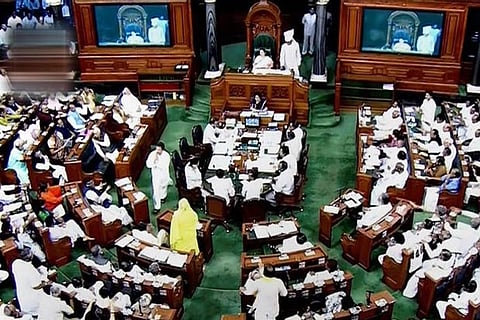

New Delhi
The Direct Tax Vivad Se Vishwas Bill was passed by voice vote and returned by the Rajya Sabha as it was a money bill. It was approved by the Lok Sabha on March 4.
Replying to the debate on the bill in the Upper House, Finance Minister Nirmala Sitharaman said the government is definitely taking all steps towards addressing the issue of reduction of litigation on a priority basis.
Responding to whether the bill will provide amnesty to those who are covered under demonetisation related cases, she said this scheme is "not an amnesty scheme at all" but the taxpayer has to pay a certain amount and that tax amount, the undisclosed cash deposit during demonetisation is liable to suffer a tax of 75 per cent.
"Hence the taxpayer has to pay 75 per cent for settling the dispute regarding the cash deposits which have been made during the period of demonetisation. So it is not an amnesty for anybody," Sitharaman said.
She said cases above Rs 5 crore have been excluded from the scheme so that large evasion related cases and fraud cases do not come into the scheme and take advantage of it.
"That is why we have limited it to the topmost extent of Rs 5 crore and not beyond. So we do not want disputes which involve larger sums to take advantage of the scheme much before we can even establish what is behind those kind of disputes," the finance minister said.
She said March 31 is the date given to pay dues without any additional penalty, whereas between March 31 and June 30 the dues can be paid with additional penalty of 10 per cent.
However, eventually the end of the scheme date will be notified by the government, Sitharaman said.
The finance minister clarified that only those disputes which pertain to or come under the Income Tax Act will be taken up under the scheme, not those which fall under the Wealth Tax Act.
"If the prosecution is based on Income Tax Act and therefore the tax authorities have taken you for a prosecution of course you will be excluded but if you have prosecution under various other acts you are welcome to join the scheme so the exclusion is only for those prosecutions which are taken under the Income Tax Act by the tax authorities," she said.
Sitharaman said the government is bringing in faceless assessment in tax disputes whereby appeals will also now become faceless.
She further clarified that the secondary adjustment to the provision only applies for assessment year 2017-18 and subsequent years. It does not apply to earlier years to which most of the transfer pricing cases pertain.
For those who have paid with a protest, if the amount already paid by the taxpayer exceeds the amount paid under the scheme refunds shall be granted, Sitharaman said.
Some members including P Wilson and Tiruchi Siva from the DMK said the bill's title Vivad Se Vishwas is in Hindi and therefore in violation of the Constitution and will trigger implication in non-Hindi speaking states.
To, this, the finance minister gave an assurance that she will ensure through a circular that all regions use it with a local language and also advertise it in a local language, agreeing that the expression in Hindi may not be understood by many regional language speaking assessees.
A large number of members were of the view that the bill is not a long term solution to tax administration issues.
M V Rajeev Gowda (Congress) termed the bill a "bandage solution" and wondered how can the Central Board of Direct Taxes (CBDT) issue a circular regarding the scheme before its passage in Parliament.
Observing that some members had raised issues on the bill and asked how can the CBDT issue a circular on the scheme before passage of the bill in Parliament, the finance minister said, "There is no breach of privilege".
The minister also told the House the end of the scheme date would be notified by the government and there is no confusion over that.
She told the House that the scheme is to give an option to tax payers for settling disputes.
The government would send a circular to states in all languages for providing detailed information about the bill.
The Direct Tax Vivad Se Vishwas Bill, 2020, was introduced by the finance minister in Lok Sabha on March 2.
As many as 4.83 lakh direct tax cases worth Rs 9.32 lakh crore are locked up in various appellate forums such as Commissioner (Appeals), ITAT, High Courts, Supreme Court and Debt Recovery Tribunals.
Also in search and seizure operations where the recovery is up to Rs 5 crore, this scheme can be availed once the bill is passed by Parliament.
Under the proposed scheme, taxpayers willing to settle disputes shall be allowed a complete waiver of interest and penalty if they pay the entire amount of tax in dispute by March 31 this year, following which a 10 per cent additional disputed tax shall have to be paid over and above the tax liability.
Further, where arrears relate to disputed interest or penalty only, then 25 per cent of disputed penalty or interest shall have to be paid if the payment is made by March 31, beyond which the same shall be enhanced to 30 per cent.
The scheme would remain open till June 30, 2020.
Visit news.dtnext.in to explore our interactive epaper!
Download the DT Next app for more exciting features!
Click here for iOS
Click here for Android